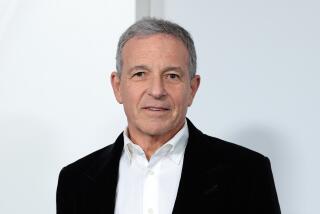Running Disney’s Word Machine
- Share via
As one of New York Gov. George E. Pataki’s most trusted aides in the 1990s, Zenia B. Mucha’s in-your-face style led Albany wags to tag her “The Warrior Princess,” “Gov. Zenia” and even “Director of Revenge.”
Now Walt Disney Co. and the media swarm around it are beginning to get the picture.
Razor-sharp and acid-tongued, Mucha, 47, was named Disney’s chief communications officer less than two years ago, after starting with the company’s troubled ABC unit. In short order, she has carved out a place as one of Chief Executive Michael Eisner’s closest advisors in a brutal battle with those who would unseat him.
She has turned her communications department into a powerful internal force, while tapping old political connections to shore up her boss’ image and position.
Under Mucha (pronounced MOO-ka), Disney scrapped a posture in which queries were often dismissed with a flat “no comment.” Executives now are pushed to challenge all comers -- although few are a match for the frequently profane chief communicator, who is quick to unleash her inner pit bull on critics and the reporters who give them voice.
“If you’re not getting heard and there’s no chance in creation of getting heard, you have to do that,” said New York public relations veteran Robert Dilenschneider. Still, he said, there’s a risk that biting back will provoke more hostility: “It’s better not to do it, if you don’t have to.”
Investors got a taste of Mucha’s pushback before the company’s March 3 annual meeting, which saw a stunning 43% no-confidence vote for Eisner. When proxy advisor Glass, Lewis & Co. counseled clients to withhold support from the Disney chief, Mucha publicly lashed it as “an upstart company that is trying to grab publicity.”
Glass Lewis Chief Executive Gregory P. Taxin said the remark soured some investors.
“They’ve been ... lobbing bombs at anybody who disagreed with them,” he said. “It left people with a bad taste in their mouths.”
Shortly before, Mucha appeared to get her fingers burned by some negative campaigning. A Feb. 22 New York Times Magazine story by Deborah Solomon said Mucha e-mailed about 20 articles chronicling shortcomings by firms associated with former director Roy E. Disney, who has led the campaign against Eisner.
Mucha’s associates said Solomon had requested research material on the former Disney board member and Norman Rockwell, about whom she is writing a book -- a contention that, in Disney’s case, the author disputes.
“I certainly did not ask Zenia to send me negative articles,” Solomon said. She described the outpouring of material on Roy Disney as “a Soviet-like deluge of propaganda going back to 1979.”
Mucha declined requests to be interviewed for this story. But associates described her as a passionate, fiercely loyal partisan whose goal was to make reporters think twice before undertaking stories that might hurt Disney -- many of them, in the company’s view, unfairly slanted.
“You can talk until you’re blue in the face” without getting a fair shake, said Kevin Brockman, who works for Mucha as a communications executive at ABC. Mucha, he said, “will confront until the story is written, and then go on to the next one.”
Mucha’s style proved a match for Eisner, who closely monitors stories about the company and communicates with her constantly. “He e-mails her all the time,” said one person who has watched the two contend with unwelcome coverage.
Communications executives throughout Disney meet weekly to check signals, and send their views upstairs via Mucha, who belongs to an inner circle that includes Disney President Robert Iger, chief strategic officer Peter Murphy, corporate counsel Alan Braverman, finance chief Tom Stagg, synergy chief Chris Curtin and few others.
Several Disney executives credited Mucha with stemming media leaks and schooling division heads on how to showcase successes and stay “on message” during the ongoing assault by dissident shareholders and an unsolicited takeover bid by Comcast Corp.
“I adore her, and she’s been as tough on me as she has on you,” said ABC executive Susan Lyne. A former journalist, Lyne said Mucha has pushed operating executives to take control of media encounters, not simply respond to questions.
Mucha, who served as Republican governor Pataki’s de facto chief of staff, has occasionally used political back channels in her fights on Eisner’s behalf.
In February, for instance, she helped broker an arrangement under which Disney retained consultant Pat Lynch, a Democrat who often crossed swords with her in Albany. Lobbied by Lynch, New York City’s Democratic comptroller voted public pension fund shares in favor of Eisner’s reelection to the board, breaking a string of embarrassing thumbs-down votes by other public funds.
Lynch later called New York’s state pension officials, who withheld support from Eisner at the meeting. This week, Democratic state Comptroller Alan Hevesi said he was no longer calling for Eisner’s immediate ouster.
A Hevesi spokesman confirmed that Lynch had called the comptroller but only after he was contacted by new Disney Chairman George J. Mitchell. The two had worked on a Northern Ireland peace initiative. Mitchell already had persuaded Hevesi to alter course, the spokesman said.
Mucha also recruited New York’s politically connected firm Mercury Public Affairs -- including Michael McKeon, who succeeded her as Pataki’s spokesman -- to represent Disney directors in a shareholders’ suit over the hiring and firing of Michael Ovitz as Eisner’s No. 2 man in the mid-1990s.
Raised largely on New York’s Lower East Side, Mucha lived with her Ukrainian parents in a Polish village before coming to the United States at age 9. Her father worked in a cemetery and her mother was a night custodian at the United Nations. She dropped out of Brooklyn College to work at a department store before joining the media staff of New York Republican Sen. Alfonse D’Amato in 1982.
In 1994, Mucha joined the gubernatorial campaign for Pataki and then moved into his administration. In Albany, she built a protective wall around her boss, gaining a reputation for being tight with information and quick with a tirade.
“I was once on the Imus [radio] program and described her as ‘the Jack Kevorkian of public information,’ ” said Fred Dicker, a New York Post editor who was known for an especially difficult relationship with Mucha.
Officially Pataki’s “senior policy advisor,” Mucha often bumped up against fellow Republicans while defending her boss.
In 1995, according to a New York Times report, Mucha touched off a spat with then-New Jersey Gov. Christine Todd Whitman, a Republican, by suggesting Whitman would have little to say about who would be named head of the jointly controlled Port Authority of New York and New Jersey. Pataki personally smoothed things over, saying: “You just roll with it, blame Zenia, and just move on.”
Later, Republican Assemblyman Thomas Kirwan publicly accused Mucha of threatening that he would face a challenger in the state’s primary because he supported Sen. John McCain (R-Ariz.) rather than then-Texas Gov. George W. Bush, whom Mucha was backing.
Kirwan urged Pataki to fire Mucha, whose language, according to a New York Post report, he compared to Joe Pesci’s in “Goodfellas.”
“If anything, they wished she worked for them,” Pataki said, downplaying such complaints in a recent interview. Still Mucha’s close friend, he added: “She’s capable of telling people in power exactly what she believes, whether it’s the head of a corporation or the governor of a state.”
Mucha reportedly tripled her $148,000-a-year government salary by moving to ABC, where friends said she had expected a respite from politics. Yet her year at the network was marred by a public run-in with the news division. Vanity Fair and other publications pointed to her as the likely source behind a New York Times blind quote that said, “the relevancy of ‘Nightline’ just is not there anymore.”
An enraged Ted Koppel, without singling out Mucha, shot back at ABC’s “attack weasels.”
Asked whether the incident hurt Mucha at the network, ABC spokeswoman Susan Binford said: “I’ve never heard anyone bring it up.” And Disney President Iger, who previously ran the network, is said by insiders to have been instrumental in Mucha’s rapid rise to a corporate post, overseeing more than a dozen executives.
New York Times reporter Adam Nagourney, who covered Pataki, said he came to respect Mucha despite the dust-ups. “When I was right up against deadline, I always found she was someone I could trust,” he said.
Tom Murphy, a former ABC chief executive and Disney board member who struck up a friendship with Mucha after she moved to Los Angeles, said her methods and background had served the company in a troubling period.
“Her experience in politics, which sometimes is crisis management, has really helped,” he said.
Mucha allies say that, unlike in the freewheeling world of political combat, she has been frustrated by federal laws that regulate the disclosure of certain kinds of corporate information. She also has complained that corporate politics are meaner than the real variety.
“In politics, they confront you and stab you in the heart,” she told one person recently. “In business, they stab you in the back.”
But others wonder whether hardball tactics belong in a contest for shareholders’ hearts and wallets.
“Politics is hand-to-hand combat on a daily basis,” said Gary Sheffer, head of corporate communications at General Electric Co. and a fan of Mucha since he served on her staff in Albany. “It’s a much more polite exchange in business. You’re talking to shareholders. You’re talking to people who invested in your business.”
More to Read
Sign up for Essential California
The most important California stories and recommendations in your inbox every morning.
You may occasionally receive promotional content from the Los Angeles Times.










